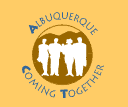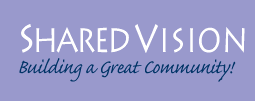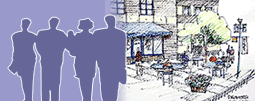| 
The principal activity of Shared Vision over the last ten years has
been to organize town halls and forums bringing together hundreds of
people at each event. These events develop civic capacity by facilitating
interaction and consensus among policymakers, the business community,
civic organizations, neighborhood groups, environmental advocates, and
the general public. The events are balanced and non-partisan, offering
a proven approach to community dialogue.
Shared Vision town halls explore virtually any issue of public interest
that builds our community. Town halls have been held on: quality growth,
economic vitality, cultural diversity, education performance standards,
and water resources. Events receive publicity through newspaper coverage,
special background pieces, radio talk shows, and other media. |
|
 |
Over
thirty elected officials have chaired Shared Vision town halls
and forums. The town halls seek to counter the trend toward "sound
bite" media education and provide opportunities for the community
to engage in dialogue on issues that impact social and economic
well-being and quality of life into the future. The town halls
provide an alternative to reactive government, instead actively
looking at where we want to be at a future time and how to get
there. Town halls are geared to meeting the public involvement
needs of implementing agencies.
|
|
 |
Typically
one-day events, town halls typically combine both EDUCATION and
DIALOGUE.
EDUCATION - The morning sessions feature presentations
and panel discussions with leading authorities, often nationally-recognized,
interacting with community leaders and experts on the topic. Panel
discussions balance differing views so the audience has the opportunity
to hear and learn about all sides of an issue. Through questions
and answers, interested citizens and knowledgeable speakers learn
from each other.
COMMUNITY DIALOGUE - In the afternoon, attendees participate
in smaller interactive break-out sessions. These sessions are
professionally facilitated and designed to allow people to talk
through issues following a discussion outline. The exchanges among
different views are the heart of the process, and efforts are
made to have balanced community representation of different interests
in each break-out group. Often participants' views change in the
course of interactive dialogue, and new ideas emerge. Each group
reports out their results in a plenary session so that groups
can share their conclusions.
|
|

|
 Shared
Vision compiles the results of the discussion based on recorders'
and facilitators' notes and tapes. The results of each event are
summarized in a high quality published report that synthesizes
diverse views into a coherent presentation. The report is mailed
to all participants and elected officials. Shared
Vision compiles the results of the discussion based on recorders'
and facilitators' notes and tapes. The results of each event are
summarized in a high quality published report that synthesizes
diverse views into a coherent presentation. The report is mailed
to all participants and elected officials.
The report gives a lasting voice to the community. It expresses
the consensus of the town hall and becomes the basis for moving
forward, communicating the will of the community to policy makers
for implementation. It defines and extends the public voice emerging
from the event so that it is communicated and available to a broader
audience.
|
|
 |
Town
Halls and Forums take 4-6 months lead time to organize. Ideally,
they should be timed to provide community input that is useful
at a key decision point by government or other institutional partner.
|
|
|
|
Back to top
|
|
|
|





